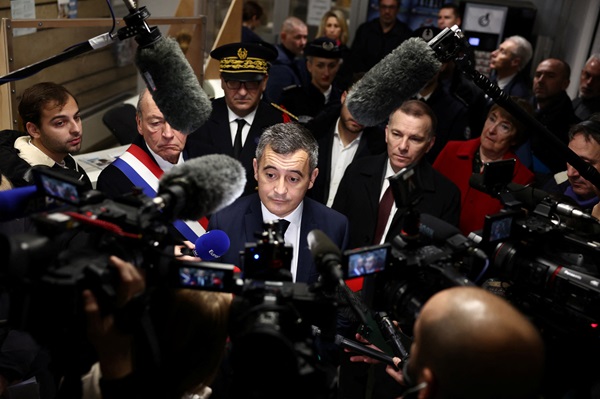 French Interior Minister Gerald Darmanin visits a police station, a day after French lawmakers rejected his immigration bill, in Maisons-Alfort near Paris, France, 12 December 2023;
Credit: Reuters/Stephanie Lecocq
French Interior Minister Gerald Darmanin visits a police station, a day after French lawmakers rejected his immigration bill, in Maisons-Alfort near Paris, France, 12 December 2023;
Credit: Reuters/Stephanie Lecocq
PARIS (Reuters) - French lawmakers sent the government's immigration bill back to the drawing board on Monday 11 December 2023, in a surprise move that cut short debates at the lower house and dealt a blow to President Emmanuel Macron's attempts to pass laws without a majority.
Lawmakers from Marine Le Pen's far-right party as well as many conservatives joined forces to reject the bill on its first day in the National Assembly, adopting a motion proposed by the Greens, which passed by just two votes.
The rejection does not mean the government needs to resign and does not signal the end of the immigration bill.
Interior Minister Gerald Darmanin, who put the bill before the lower house of the Parliament before its rejection, said he offered to resign during a meeting with Macron.
But Macron opposed this resignation, Darmanin told TF1, adding he had been asked by the president, as well as Prime Minister Elisabeth Borne, to find another way to put the bill forward.
The government can now decide to send it back to the upper house, send it to a joint committee of senators and deputies to find a compromise, or pull it, which is unlikely. It can also use special executive powers to force its adoption without a vote.
"I offered my resignation because it's normal to do so when you fail [...] we will see what we decide [...] Tonight we will meet with the prime minister, the president asked us to submit to him tomorrow the next step for the bill, " Darmanin told TF1
The immigration bill has been a key plank of Macron's attempts to show he can be tougher on law and order issues while keeping France's doors open to foreign workers who can help the economy.
But short of a majority in parliament, he has struggled to pass a bill that has strict provisions disliked by left-wing lawmakers and more liberal aspects criticised by some conservatives and the far right.
The government has presented the bill as essential to expel foreign criminals more easily. One provision removes a ban on expelling those migrants who arrived in France before the age of thirteen, as was the case for the alleged Russian-born Islamist militant who killed a French teacher in October 2020.
Other provisions that have been hotly debated are whether non-EU migrants should continue to get access to free medical coverage in France, as well as the government's aim to facilitate the legalisation of workers in industries suffering from labour shortages such as cafes and restaurants.








